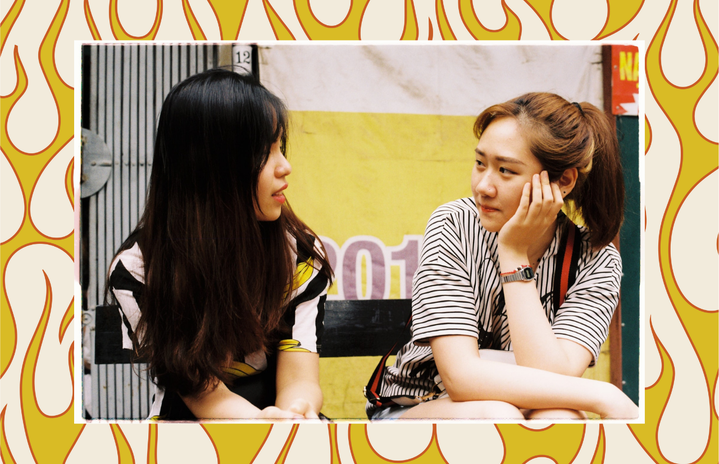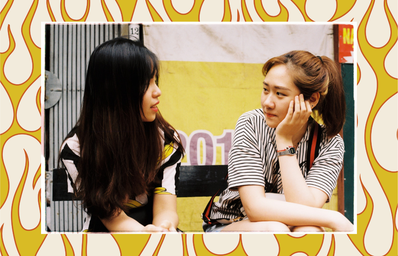Hometown friends are a part of some of the most memorable moments of your life, from your first breakup to your first failed test, the loss of a loved one, your first homecoming, and the list goes on. I grew up with a core group of friends I did everything with. We had sleepovers, hosted game nights, had holiday parties. Then, college came around, which felt like the end to my childhood. The friends I spent every day with were now going to be hundreds of miles apart, and the harsh reality of watching my hometown friends make new best friends was something I was not ready for.
I had faith that our friendship was strong enough to withstand the distance and new friendships, but I would be lying if the first time I saw my childhood best friend with a new college friend, it didn’t sting a little (okay, maybe a lot!). As someone who lacks in the making friends department, I found it hard to cope with the fact the friends I spent my whole childhood with were having the time of their life and seemed to have no issue making friends. Meanwhile, I’m in my dorm reminiscing on the simple high school days where I didn’t have to worry about making new friends in a sea of unfamiliar faces.
However, I learned that as we grow older, friendships change, and though it might not seem like it right now, this feeling of being left behind won’t last forever. From pinpointing your worries to having open communication, there are ways to handle seeing your childhood best friends make new best friends when you go to college.
Understand you don’t have to talk every day to maintain a friendship.
True friends aren’t the ones you talk to 24/7, but rather the ones that when you do talk to them, it feels like there was no time spent apart. Quality friendships can overcome times when you talk less often. Though it might be a shock when you go from seeing your friends everyday to now only seeing what’s going on in their life through a Snapchat story or a carousel of photo dumps on Instagram, hometown friends that are meant to be in your life forever don’t require a conversation every day. So if you find yourself talking to your hometown best friends less, know that it’s okay and a completely normal experience during this transformative time.
Identify what is making you worried.
During this time in your life, there might be a lot that is scaring you, whether that is feeling like your friends are going to forget about you, or just worried about being on your own.
Hannah Ly, a licensed family therapist, tells Her Campus, “I’d say listing the worries out and identifying if they are realistic (it may be hard to find things to talk about when I see them next), or unrealistic (they won’t ever want to talk to me again because they will see how awful I am compared to the new people they meet) can help with managing your fears about drifting away from your friends. Journaling out these worries is a helpful way to process.” Deciphering between unrealistic and realistic worries can help you come to terms with your friends making new friends because you’ll realize a lot of the fear is in your head.
Talk openly with your hometown friends about your feelings.
Communication is key, especially in long-distance friendships. Concealing your feelings will only make things worse, and your friends won’t be aware of how you are feeling. Ly agrees that you should speak directly to your friends about your experience and your needs in the friendship. She says, “Using I statements (‘I feel worried about losing touch with you’) is direct and centers your feelings in the conversation. Avoid generalizing or being passive about your feelings and needs because it can create miscommunication or unrealistic expectations.”
I’m definitely guilty of sulking by myself and being upset with someone when they don’t even know I’m upset, but this does more harm than good. Speaking openly about your feelings helps your friends understand you and what is going on, which can help them accommodate your feelings through maybe more effort or more communication.
FInd peace in time alone.
Whether your friendships are coming to an end or you’re seeing your friends less frequently, alone time might occur more often in college. This reality isn’t what is normally portrayed in movies or college brochures, so there might be an adjustment period at first. Though you might feel lonely at times or like an outsider looking in, don’t dwell on being alone, but rather embrace it. Ly advises using the time alone to reconnect with yourself and things you love most. You can recharge through self-care, such as a face mask or a long shower, or calm yourself with a comfort show or book, music, meditation, or journaling.
Know that growing up means growing up in your friendships, too.
Friends that were based on drama, childhood hangouts, and first relationships were also friendships that consisted of being a support system for one another in times of grief and sadness. I would be lying if I said my friends in high school weren’t there for some of the most tumultuous times in my life. This support carries on throughout college and adulthood, but the more childish aspects are left behind. So, just like you guys grew up together, you also are growing up together in your friendship, which means being there for one another from a distance.
Adult friendships are more complex and meaningful; they aren’t defined by a yearbook signature or who you sit with at the lunch table. In college, you’ll find yourself searching for friends or maintaining old friendships that share the same values and beliefs as you, which may or may not be the same people you went to high school with. Accepting that your friendship will change as you grow older will help you cope with the fact that this might come with them making new friends.
Growing up in friendships can also mean drifting apart and friendships coming to an end, and that is okay. According to Ly, “College can be a time of ideological awakening, so in a way drifting apart from friendships from your past means you could be growing as a human.”
Your hometown friends making new friends doesn’t mean you’re being left in the dust. It might just mean that you should use this opportunity to embrace change and focus on yourself. College is a time to break away from what was familiar to you. For some, that might mean distancing yourself from hometown friends, and for others, that might mean thriving in a new environment by trying new experiences.
At the end of the day, childhood friends will always be a part of your life in some way because they watched you grow up. Some might be standing next to you on your wedding day and some you might only see through pictures on your feed. Friendships change and people change as we go through our different stages of life. If you feel yourself drifting from a long distance friend, evaluate why you’re drifting and what it means for the relationship. Reach back out, or maybe accept the distance to focus on yourself.


